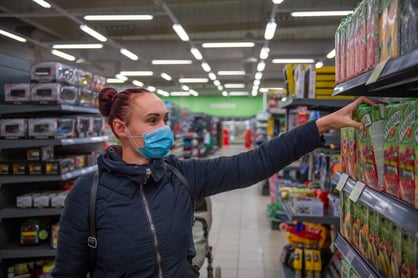Maintaining A Culture of Food Safety: Why Your Team Should C.A.R.E.
Developing a culture of food safety is not about getting to a specific end goal. A culture of food safety is something that requires nonstop evaluation and maintenance to consistently have a workforce that recognizes the bigger picture of food safety. To better help your team understand this bigger picture, you can utilize the C.A.R.E. acronym. C.A.R.E. stands for consumers, accountability, recalls, and education.
Consumers and Food Safety Culture
The first letter of C.A.R.E. stands for “Consumers” and it’s first for a reason. Your consumers are arguably the most important reason to be mindful of your food safety practices. Whether it’s a person trying your products for the first time or someone who’s been loyal to your brand for decades, all trust in your brand can be tarnished if they are led to believe that food safety is not a top priority at your organization. Consumers keep the company in operation and while they most will not ever see the inside of one of your facilities, they’ll be thankful for being able to trust your product over other brands for themselves and their family’s safety.
 One way to make this resonate with your teams is to stress the fact that we’re all consumers and that many of us utilize the same products we produce. We want to feel safe consuming the products we eat at restaurants and grocery stores, and we should especially feel safe about any products that we produce. If there is ever a concern about the safety of your products from your employees, you should encourage them to speak up about it to their supervisor.
One way to make this resonate with your teams is to stress the fact that we’re all consumers and that many of us utilize the same products we produce. We want to feel safe consuming the products we eat at restaurants and grocery stores, and we should especially feel safe about any products that we produce. If there is ever a concern about the safety of your products from your employees, you should encourage them to speak up about it to their supervisor.
Learn more about the impacts to a food safety and quality culture!
Accountability and Food Safety Culture
The second letter of C.A.R.E. stands for “Accountability”. No matter how much monitoring is involved we’re ultimately responsible for our own actions on a day-to-day basis. Stressing the importance of everyone’s responsibility in policing their own behavior can resonate better than always having someone watching over what they do. Even the most pristine food processing facilities can put themselves at risk of pathogen spread if just one employee decides to do a “splash and dash” hand wash when nobody is looking.
Rewarding and encouraging those employees that are clearly holding themselves accountable with proper hygiene and PPE donning shows your teams that their efforts do not go unnoticed. This type of positive reinforcement can help teams that are struggling to remember proper protocols by creating a positive experience that they can recall each time they perform a hygiene procedure.
Learn more about developing a positive food safety culture!
Recalls and Food Safety Culture
The third letter of C.A.R.E. stands for the elephant in the food safety room, “Recalls”. Ultimately a recall is the worst-case scenario that can come from poor hygiene and food safety practices. Pathogens can spread at an alarming rate from an improperly washed hand to other employees, equipment, or the products themselves. Many employees at your facilities may never have encountered a recall before at their workplace so It’s important to review what could happen during one and how each employee can help prevent a recall.
While some recalls are not caused by improper hygiene at food processing plants, the best defense against any type of internal food recall begins in your hygiene zones. Employees should know that all pathogens from outside of the facility are stopped dead in their tracks once they get to a hygiene zone. Teams should think of a hygiene zone as a sort of secondary shower or bath where they cleanse themselves of anything that they might have picked up on the way to work.
Learn more about the cost of food recalls!
Education and Food Safety Culture
The last letter of C.A.R.E. stands for “Education”. This goes back to the point that food safety culture is an ongoing thing that an organization strives for and ultimately this responsibility lies with food safety leaders. It is up to food safety managers to be updating their teams on the latest hygiene SOPs and to train new team members on food safety initiatives so that facilities continue to maintain and progress their food safety culture. 
Explore our Food Safety Toolbox for Hygiene Training Resources!
Another thing that food safety managers need to educate themselves on is the latest news in food safety. This includes the introduction of new types of technologies that are being used to better food safety in the industry. For example, many facilities have adopted automated hygiene to ensure that their teams are receiving 99.9% of pathogen removal with every hand wash. With CleanTech® Automated Handwashing Stations, food safety leaders can rest assured that hand hygiene is being adequately addressed in their hygiene zones so that they can focus on building a lasting culture of food safety in other areas of the facility.






